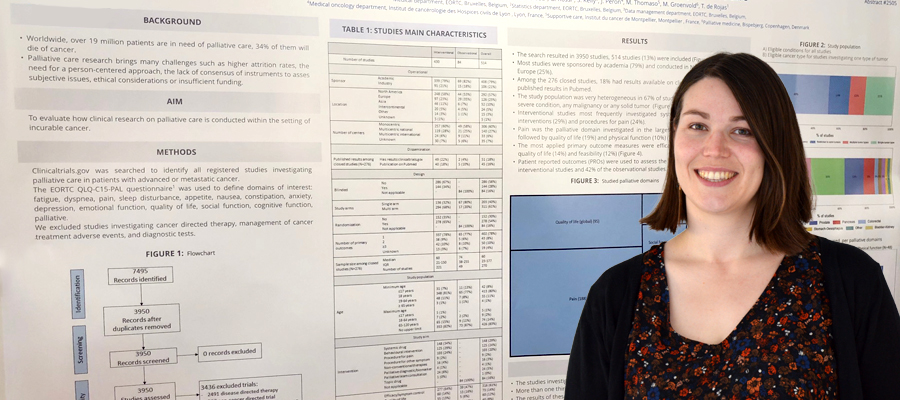Palliative care are we doing enough research?
3 Oct 2019
Palliative care is designed to relieve symptoms to improve the patient’s quality of life. Palliative therapies can be used at any stage for pain or sickness management as well as to control side effects of cancer treatment. In advanced cancer, it may help a patient to live more comfortably when there is no cure. According to the WHO, there are 19 million patients worldwide in need of palliative treatment.
Marie Vinches, MD, medical fellow from the European Organisation of Research and Treatment of Cancer (EORTC), presented her meta-research study evaluating how clinical research in palliative care is conducted within the setting of incurable cancer during ESMO 2019 congress in Barcelona on 28 September.
“Palliative care has evolved over time, and the oncology healthcare community has become increasingly aware of its importance,” she said. “Nevertheless, the literature in the field suggests that there is limited evidence-based care for patients with cancer in palliative and end-of-life settings.”
“We performed a meta-research (meaning research about research) to see what the landscape of research was in palliative care in a specific setting: patients with incurable cancer who are not receiving anti-cancer treatment.”
She explained that “the number of research studies conducted in palliative care is scarce: When searching for the term “Cancer” on clinicaltrials.gov, over 69,000 studies can be found. However, only 514 studies (0.8%) were identified in our meta-research as studies investigating palliative care for patients with incurable cancer.”
Furthermore, she found that the results of those trials are not shared sufficiently: only results of 16% (of closed trials) are published in PubMed and 19% in clinicaltrials.gov. Interestingly, pain was investigated in the largest proportion of studies, leaving other issues under addressed.
“There is a lot of room for improvement: I believe that increasing the number and quality of research studies in palliative care and improving the dissemination of results would be important steps to improve the care of patients with incurable cancer, “ she said. “Unmet needs remain, and clinical research is still required to improve standards of care for patients with incurable cancer.”
Roger Wilson was diagnosed with a soft tissue sarcoma in 1999. Roger has had ten operations, chemotherapy and radiotherapy. These have included a lower leg amputation in 2007 and two thoracic metastectomy operations in mid-2013. Roger leads the patient advocacy organization Sarcoma UK.
“The convergence of oncology and palliative medicine is an important evolution in the clinical care of cancer patients and the need should be more widely recognised,” he said. “Palliation is not just about end-of-life care. The gap is evident from this study and, as a patient who appreciates symptom control.”
Marie Vinches’ call for investigators is not to forget these large numbers of patients for whom anti-cancer therapies are not optimal. She emphasised that “the quality of palliative care needs to improve with the development of evidence-generating clinical trials for patients with incurable cancer and no active treatment options.”
“I would urge greater attention to the palliative needs of all cancer patients,” says Roger.
Related News
EORTC: Advancing research and treatment for rare cancers
29 Feb 2024
EORTC Fellowship Programme: celebrating more than 20 years of impactful collaboration
22 Feb 2024
Appointment of Malte Peters as EORTC Strategic Alliance Officer
9 Feb 2024
Unique series of workshops in partnership with the European Medicines Agency (EMA)
7 Feb 2024
EORTC launches a prominent clinical trial in older patients with locally advanced (LA) HNSCC (Head and Neck Squamous Cell Carcinoma)
14 Dec 2023
Seven IMMUcan abstracts selected for ESMO Immuno-Oncology Congress 2023
6 Dec 2023
EORTC Quality of Life measures integrated in CDISC
20 Nov 2023
EORTC and Immunocore are collaborating to launch the ATOM clinical trial of tebentafusp in Adjuvant Uveal Melanoma
7 Nov 2023
Treatment with decitabine resulted in a similar survival and fewer adverse events compared with conventional chemotherapy in older fit patients with acute myeloid leukaemia
31 Oct 2023
New results and forthcoming EORTC trials in rare cancers, lung, head and neck, and breast carcinomas presented at ESMO 2023
20 Oct 2023


